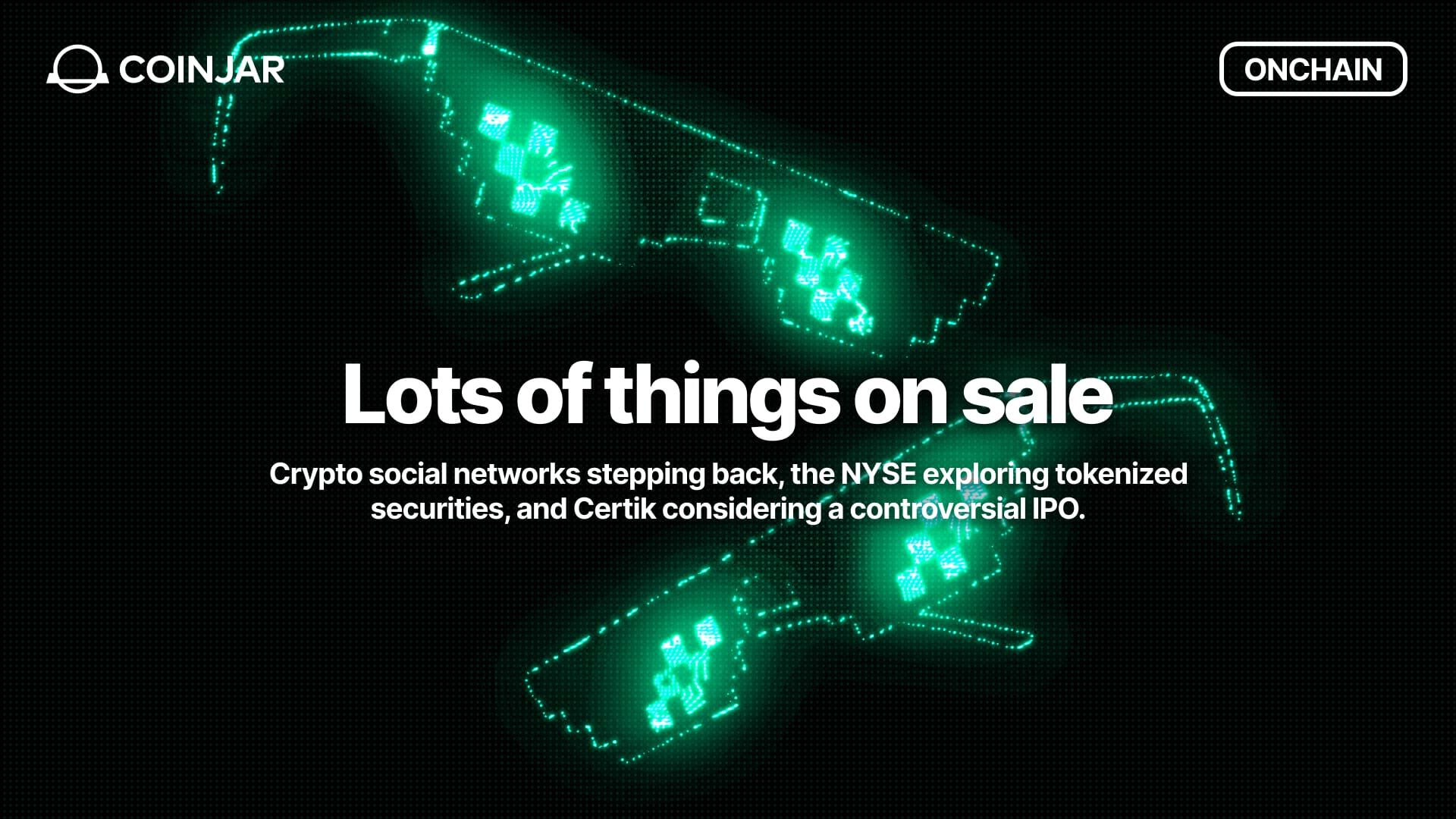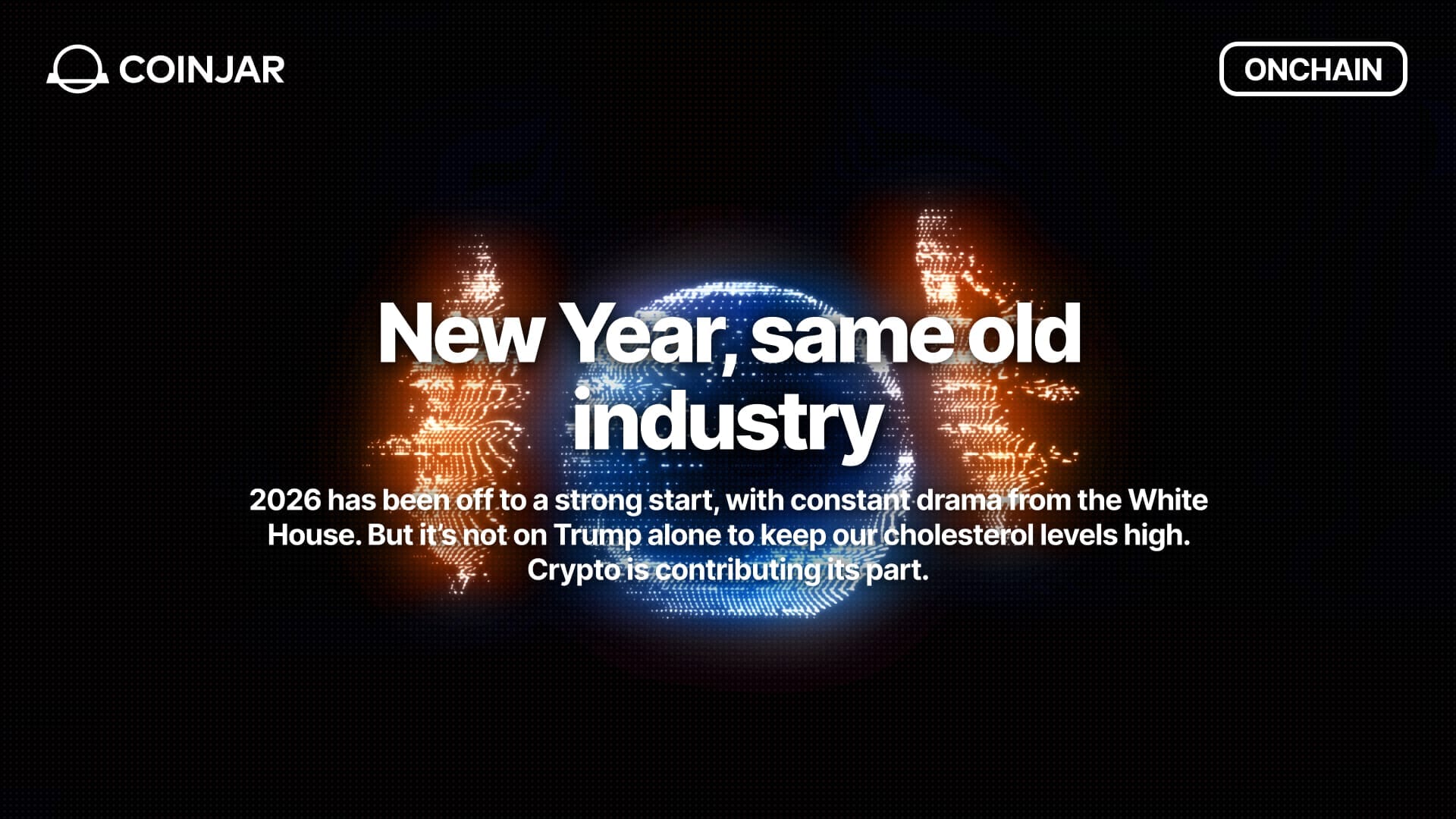Offchain: 5 Big Crypto Themes For 2024
December 28, 2023I think it’s safe to say that 2023 was not as bad as expected. Will 2024 continue crypto’s winning form?
Share this:

I think it’s safe to say that 2023 was not as bad as expected. Will 2024 continue crypto’s winning form?
I don’t want to blow your mind, but on January 3 Bitcoin – and by extension cryptocurrency in general – will turn 15. Not yet old enough to drive, but old enough to do a whole bunch of really stupid shit while simultaneously making you marvel at this thing you helped create (I say this as the parent of a 5-year-old, but I presume things don’t change too much).
Compared to this time last year, optimism and its twin, greed, reign. Prices are soaring, dumps are short lived and crypto is slowly being welcomed back into the halls of polite society. So, what can we expect from 2024? Where do we go from here?

SOL is the new ETH
I’ll preface this one with a disclaimer: Ethereum ain’t going anywhere and there will almost certainly come a time next year when people start laughing at the OG Layer 1 only for it to rip so hard it can be heard from space.
With that out of the way, Solana is definitely making its claim as the heir apparent to Vitalik’s baby. Now firmly entrenched in the top 5 by market cap, over the last month Solana has, at different points, overtaken ETH in DEX volume, NFT transactions and stablecoin usage. Money is pouring in and starting to slosh around the ecosystem like so much unlit rocket fuel.
When we start talking about the 100x coins of the 2024 bull market, it’s likely that a fair few of them will be on Solana. But be careful: your chances of hitting the jackpot are marginal and Solana’s low barrier to entry means rug pulls and scams will be endemic – for instance, 5000 coins launched on Dec 22 alone. Have fun, bet small and get ready to take your profits because these infernos have a way of suddenly burning themselves out.
The king takes their throne
When crypto markets take a left turn into the ludicrous zone, there’s a tendency to look back at Bitcoin with the kind of patronising affection usually reserved for people in their 80s. “Oh that’s so sweet that you made 20%. I 5xed in two days by dropping my life savings into something called Pooblaster whose website is just a video of a dog shit being blasted into space.” (Note to self: launch this coin on SOL.)
But let’s not forget that the only reason we’re back doing all this right now is because the world’s largest asset manager decided they wanted to shill a Bitcoin ETF to the masses. By the time I write the next edition of this newsletter, that ETF could be a reality.
If it comes to pass – and the chances are exceedingly high – it’s not necessarily a guarantee of instant highs and the forever up market (people can and do enjoy shorting ETFs). But it is a guarantee that Bitcoin remains the nexus point between crypto and the rest of the world – and what it does and how it's perceived will dictate whether the good times keep on good timing.
Ain’t nothing sexier than stability
I’ve been meaning to write a post about stablecoins for months now, but, let’s be honest, they’re just not that sexy.
But they are important. Few metrics are as predictive of market health as the flow of stablecoins into or out of the system. Back in October the total stablecoin value started to increase for the first time since early 2022. Since then, the crypto markets have notionally gained US$670 billion in value. The inflows are still minor, but the mere fact that money has stopped flowing out has seen a return to some sort of equilibrium.
Yet stablecoins are important as more than just market indicators. On any given day, stablecoins account for at least 80% of the total crypto transaction volume. If you’re looking for crypto’s killer app, stablecoins are it. They work, they’re easy to understand and they serve an obvious purpose.
For people in countries with volatile and weak currencies, stablecoins can help preserve wealth and facilitate trade. For others it's about filling the gaps that the international banking system never bothered to deal with. But as stablecoins surge and spread, it’s worth keeping an eye on where they’re going, who’s using them and what the powers that be want to do about it.
Infinite complexity
Back in 2021 I remember having a distinct moment where I looked up and realised that I, a man working full-time in the crypto industry, basically had no idea what was happening any more.
Well, I’m here to tell you that this next cycle is going to be that times a thousand. At a basic level it’s about alternative L1s like SOL and AVAX building thriving ecosystems to rival Ethereum’s, full of their own DEXs, DAOs, NFTs and the rest of the alphabet soup that is modern crypto.
Then there are inscriptions, the controversial technique for building NFT-like data packets into the information of the blockchain itself. It started with Bitcoin, but now people are making inscriptions on any chain they think they can extract some value from, up to and including L1s like ETH and SOL whose sole purpose is to facilitate exactly these kinds of transactions and oh good now my nose has started bleeding.
Oh and did I mention RWAs (real world assets), which allow people to tokenise ownership of everything from real estate to sport teams, art, cars, watches and the right to a hug from The Rock (this doesn’t exist but Dwayne should make it happen). And then there’s gaming, which could easily become its own distinct crypto universe – and one with a frankly huge assessable market.
What I’m trying to say is that it’s only gonna get more hectic from here, so focus on the areas you understand, the ones that speak to you, and accept that everything else is going to feel like it’s being explained to you in ancient Sumerian – and that’s just fine.
History doesn’t repeat
Bitcoin undergoes a halving every four years. The crypto market has experienced three four year boom-bust cycles. Coincidence? Or preordained fate?
As the planets line up once more, it’s tempting to think it’ll be that simple once again (and maybe it will!), but the great truism of trading is that if everyone believes something will happen it generally won’t. And this time round there are a lot of geopolitical and macroeconomic headwinds that didn’t exist during crypto’s first decade.
So, be as bullish on 2024 as you want – I know I am – but also be alive to the possibility that things can change quickly and the point where you’re most certain about something is often the point that your certainties come undone.
Alright, now go enjoy your New Year's you filthy degens. See you in 2024. Pooblaster 2 tha moooooooooon.
Luke for CoinJar
The above article is not to be read as investment, legal or tax advice and takes no account of particular personal or market circumstances; all readers should seek independent investment, legal and tax advice before investing in cryptocurrencies. This article is provided for general information and educational purposes only. No responsibility or liability is accepted for any errors of fact or omission expressed therein. CoinJar, Inc. makes no representation or warranty of any kind, express or implied, regarding the accuracy, validity, reliability, availability, or completeness of any such information. Past performance is not a reliable indicator of future results.
Share this:
On/Offchain
Your weekly dose of crypto news & opinion.
Join more than 150,000 subscribers to CoinJar's crypto newsletter.
Your information is handled in accordance with CoinJar’s Privacy Policy.
More from CoinJar Blog

Onchain: Lots of things on sale
January 28, 2026Story One Crypto Social for Sale Been an interesting time to observe what happens to the still-standing crypto social networks. Aave, a leading DeFi protocol and creator of...Read more
CoinJar Unlocks European Expansion with MiCA Authorization
January 21, 2026CoinJar has just become a crypto asset gateway for Europe, having received full authorization from the Central Bank of Ireland as a Crypto-Asset Service Provider under...Read more
Onchain: New Year, Same old industry
January 15, 20262026 has been off to a strong start, with constant drama from the White House. But it’s not on Trump alone to keep our cholesterol levels high. Crypto is contributing its...Read moreYour information is handled in accordance with CoinJar’s Privacy Policy.
Copyright © 2025 CoinJar, Inc. All rights reserved.
CoinJar, Inc. is a registered Money Services Business with FinCEN and licensed as a money transmitter, NMLS #2492913. For a list of states in which CoinJar, Inc. is licensed or authorized to operate, please visit here. In certain other states, money transmission services are provided by Cross River Bank, Member FDIC.
This site is protected by reCAPTCHA and the Google Privacy Policy and Terms of Service apply.